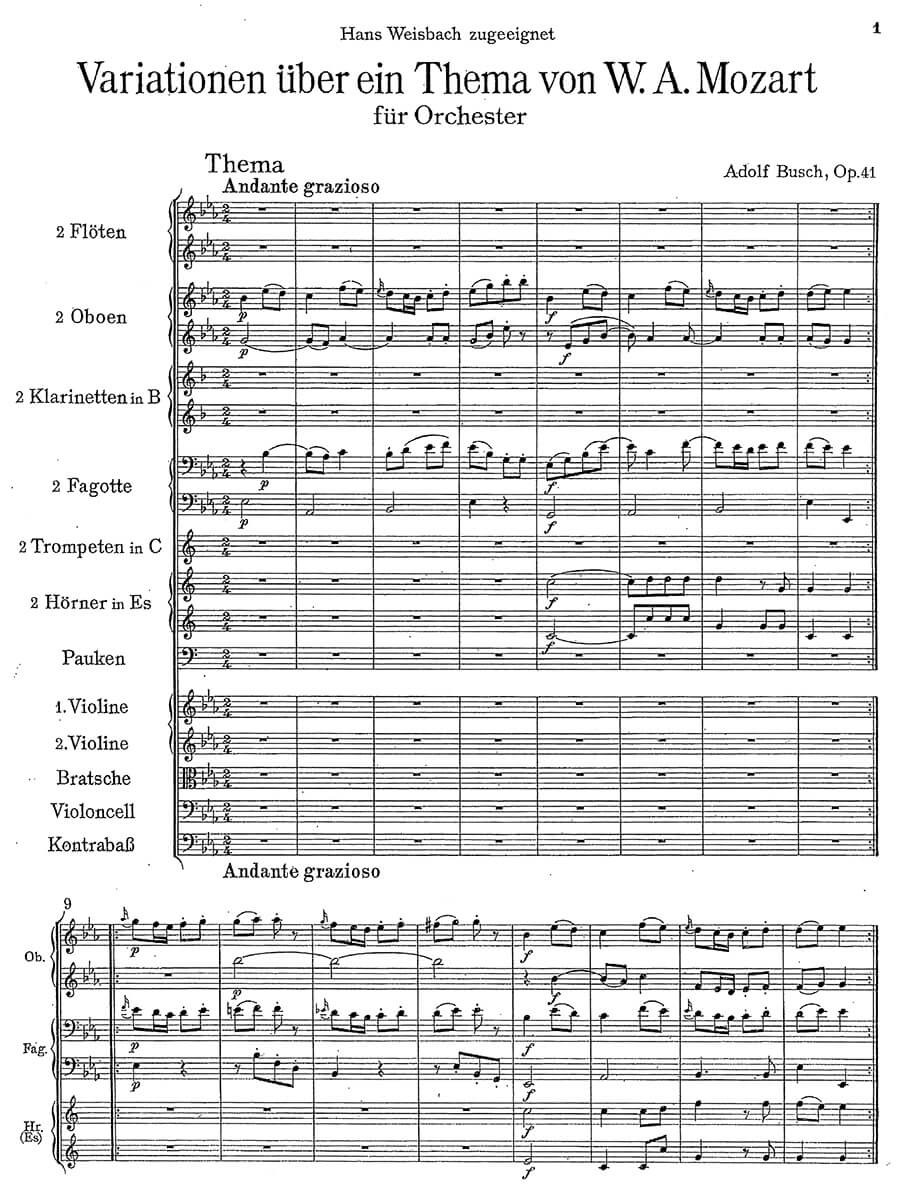Variationen über ein Thema von W. A. Mozart für Orchester op. 41, edited by Jürgen Schaarwächter
Busch, Adolf
25,00 €
Preface
Busch, Adolf – Variationen über ein Thema von W. A. Mozart für Orchester op. 41
edited by Jürgen Schaarwächter
Adolf Busch – a composer? The musician is known primarily as a performer, even if the community of those who appreciate historical recordings is not necessarily growing rapidly today. But anyone who has heard Busch as a violinist is not only influenced by his playing when listening to recent interpretations of the same works, but also makes demands that cannot always be met. As an interpreter, Adolf Busch was famous for the intensity of his musical approach. He refused musical beauty as an end in itself (just like his brothers) – the depth of his penetration into the musical substance is still considered exemplary today. As a person, too, Busch was similarly uncompromising – his position against Nazi Germany, his resolute devotion to and commitment to what he believed in and what was important to him are still exemplary today.
Adolf Busch was born in Siegen in 1891, the second of seven surviving children of a carpenter who, through much practice, had become a violin maker, and the daughter of a locksmith who ran her own handicrafts shop. Adolf received his first violin lessons from his father at the age of two and a half, he performed in public for the first time at the age of four, and the “child prodigy” label was not long in coming. From 1902 to 1909 he studied at the Cologne Conservatory with Willy Hess, Bram Eldering and Fritz Steinbach. Adolf’s brother, the conductor Fritz Busch, describes his brother’s composition lessons with Steinbach as “rarely given[…] but all the more excellent for it[…]”. Large and small forms were explored, and Steinbach also provided his pupil with poems on song composition. On 26 January 1909, Adolf Busch met Max Reger; accompanied by his brother Fritz, he played the composer’s Violin Concerto in A major from memory. Reger was enthusiastic about his playing, and the two subsequently gave many concerts together. Busch’s compositional development owes much to this friendship, even though other composers, such as Ferruccio Busoni, later left their mark on Busch’s oeuvre, which was nevertheless quite unique.
In 1912 Busch became concertmaster of the Vienna Konzertverein Orchestra and in 1918 was appointed professor at the Musikhochschule in Berlin, which he gave up after only a few years. Already in Vienna he had become primarius of a string quartet, which was renamed the Busch Quartet in 1918.
Adolf Busch became best known because as early as 1933 – by then living in Riehen near Basel – he cancelled all concerts in Germany because of the beginning persecution of the Jews; he was one of the founders of the Lucerne Festival and in 1939 emigrated to the USA. There he was a co-founder of the Marlboro School of Music in 1950, and several of his descendants are still closely associated with the summer courses and the associated concerts today.
Adolf Busch’s compositional development took place parallel to his brilliant career as a violinist, even if his compositional activity had to be subordinated to concert performances. His oeuvre includes several symphonies, a violin concerto, a piano concerto and other orchestral works, organ and piano music as well as songs, several choral works, but above all chamber music in a variety of instrumentations. Busch experimented with a hardly manageable number of different duo, trio or quartet instrumentations, but we also find, for example, a quintet for saxophone and strings, another for flute and strings and a string sextet. The fact that many of his works have been forgotten for a long time is due not least to the difficulty of finding the scores – most of them remained unprinted or are out of print today. It was not until January 2022, after many decades of oblivion, that Busch’s Piano Concerto in C major op. 31 could be performed again in Reichenbach in the Vogtland region, after new performance material had been created. Many of Adolf Busch’s music manuscripts are deposited or donated at the Paul Sacher Foundation in Basel. Seventy works with opus numbers may not seem like much at first – but many of these works are divided into opus 2a-c or even 69a-e. Nor is it easy to characterise the compositions in their diversity – they can be too different in terms of facture, ambition and target audience, from house music to symphonies with a final chorus or the choral-symphonic 6th Psalm, which was completed only a few days before his death. …
Read full preface / Das ganze Vorwort lesen> HERE
Score Data
| Edition | Repertoire Explorer |
|---|---|
| Genre | Orchestra |
| Size | 210 x 297 mm |
| Printing | Reprint |
| Pages | 76 |
